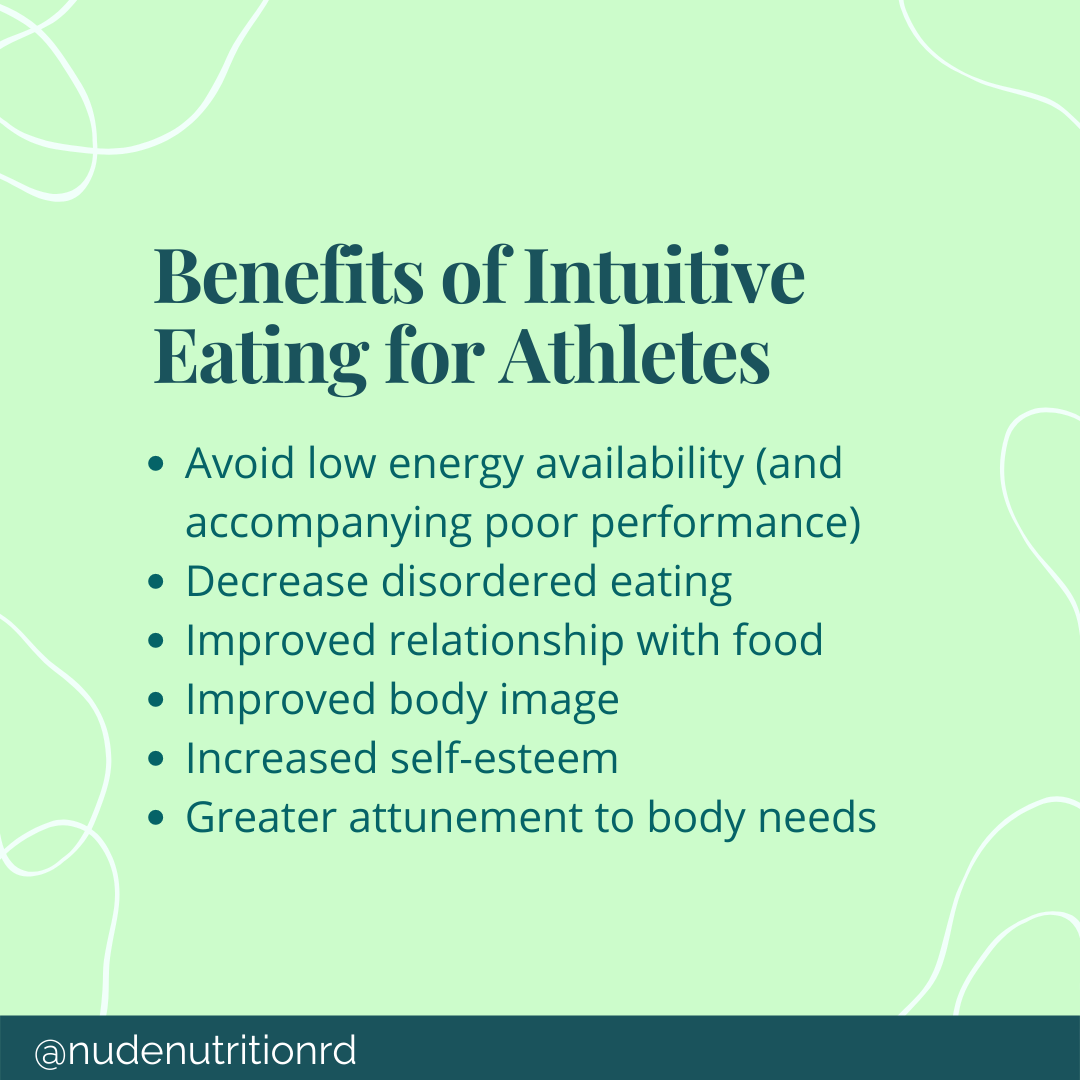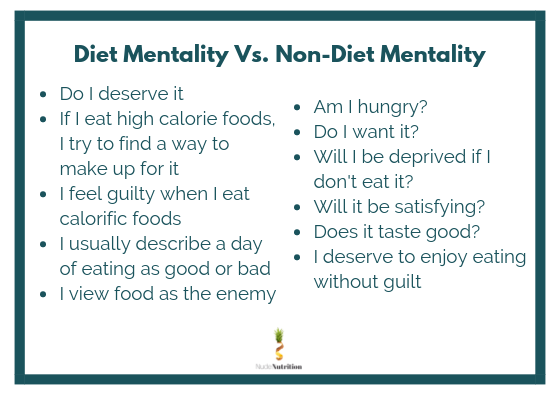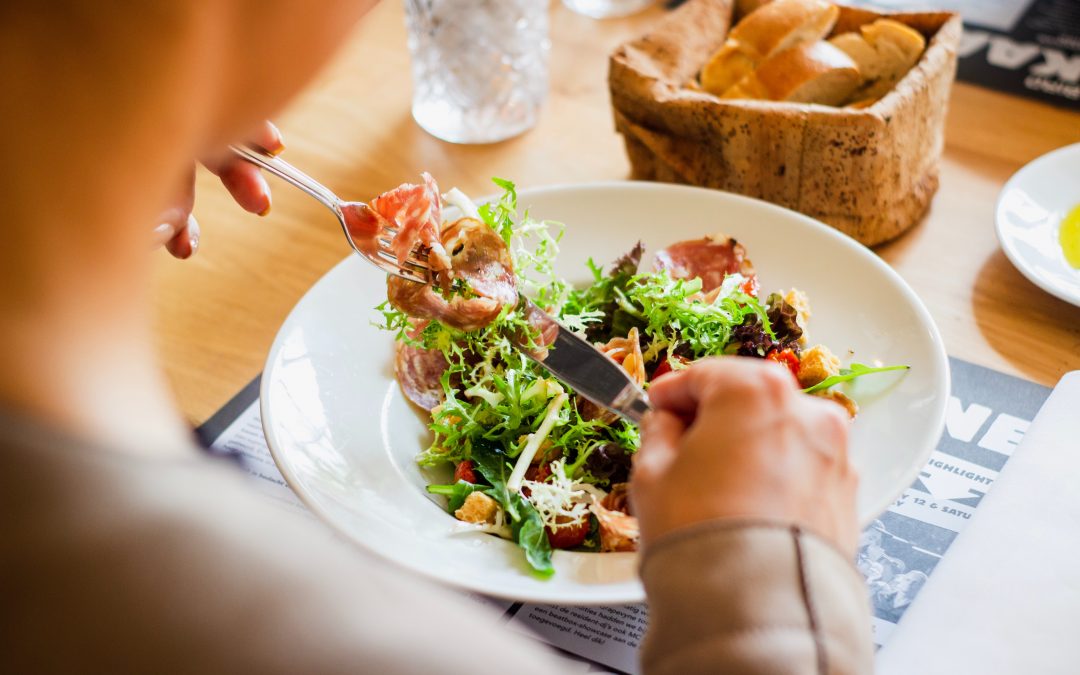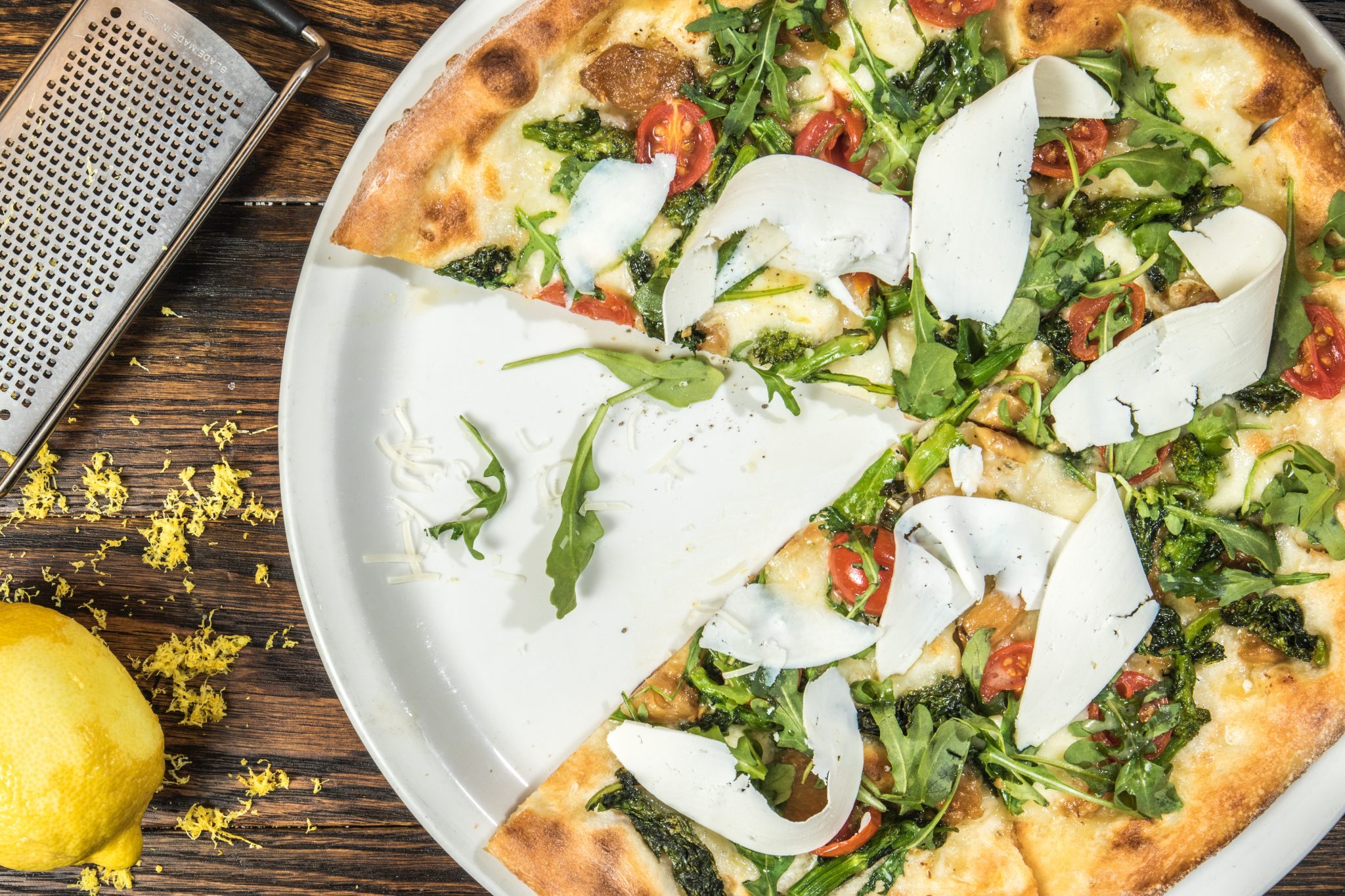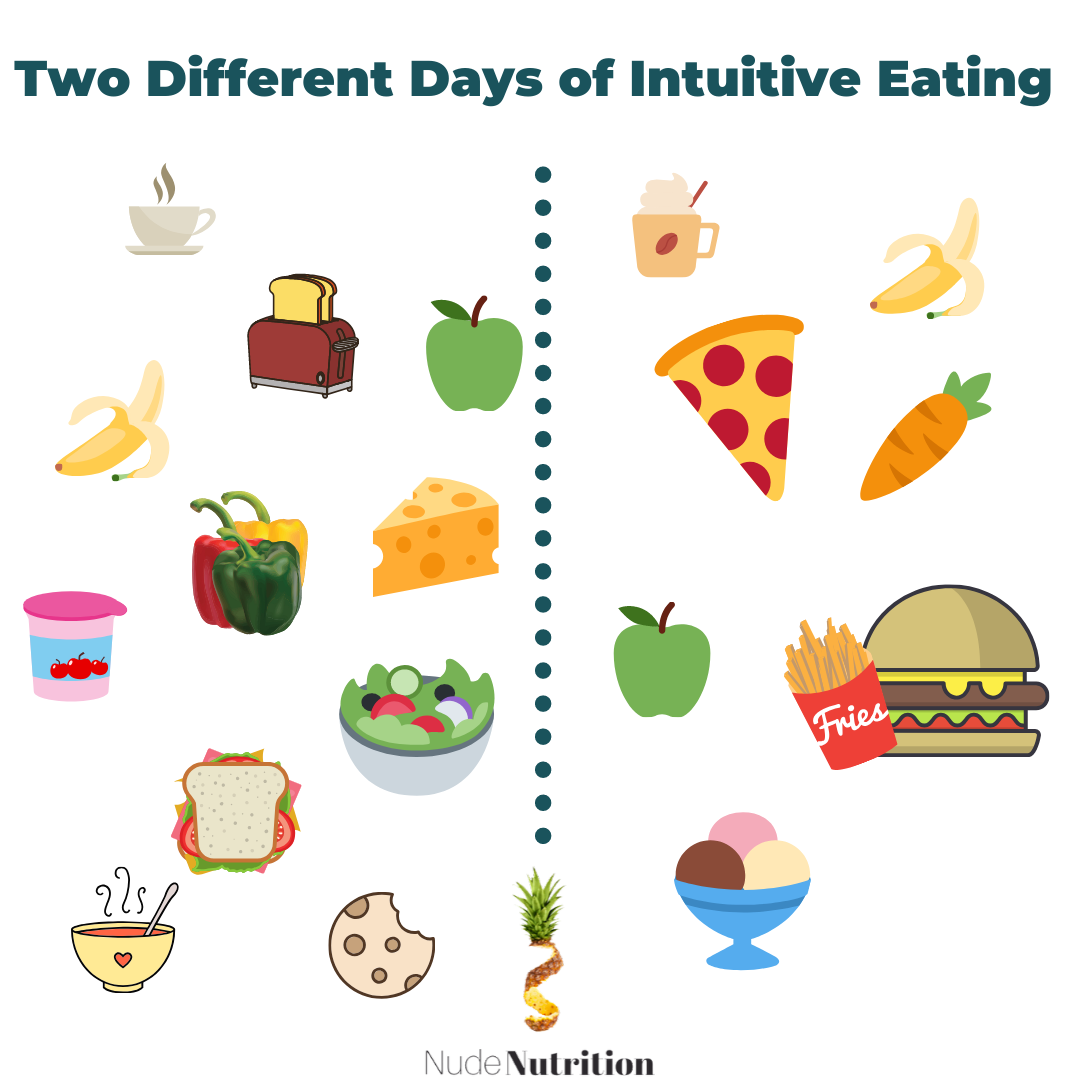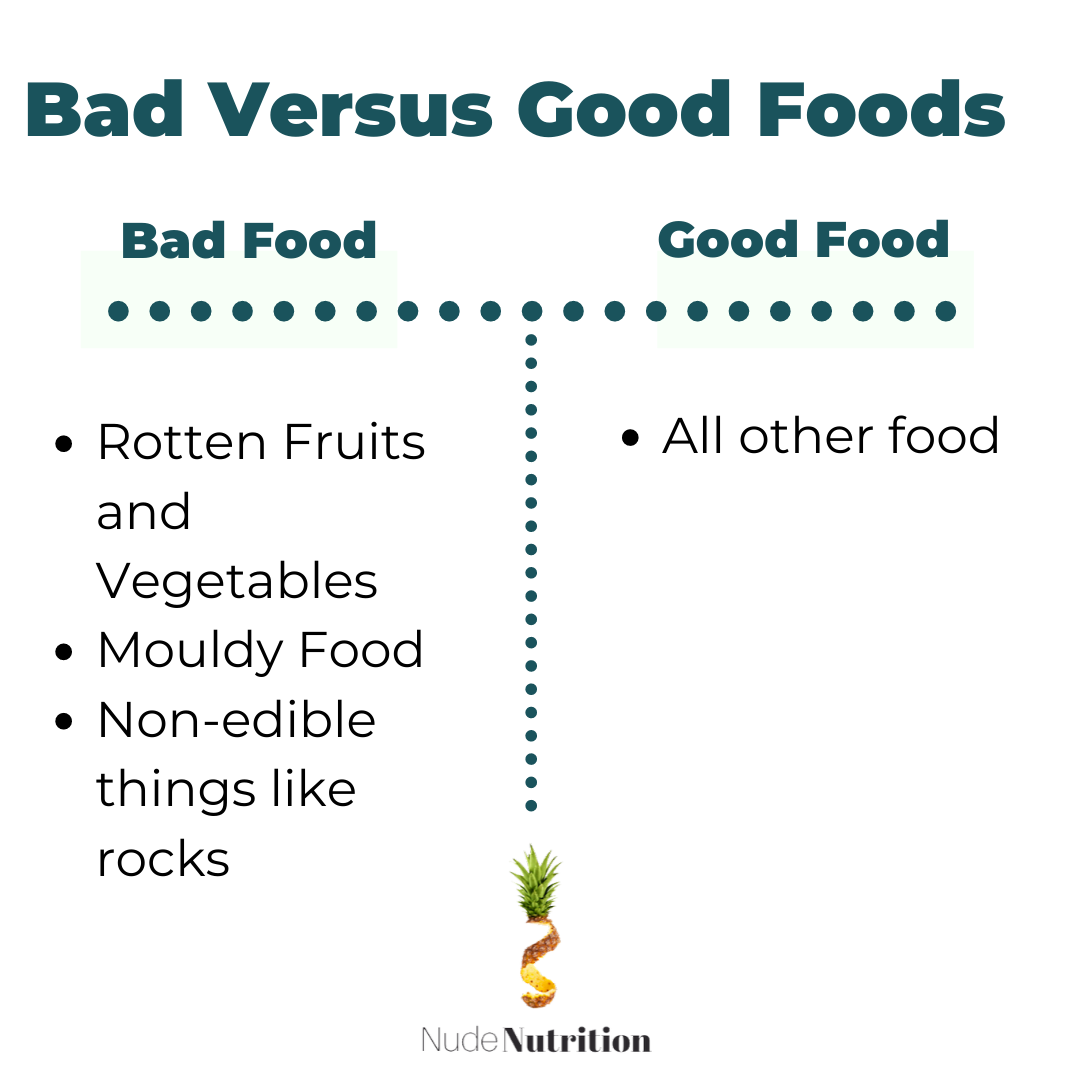As we plunge into the new year, the talk of dieting seems to be ramped up in the media and among our friends, family, and coworkers. So, we thought that it would be a good idea to touch on the question, “Does Intuitive Eating Work?”
To get started, what does “working” mean? To some, working would mean achieving a smaller body size. After all, one of dieting’s defining characteristics is the intentional pursuit of weight loss. On the other hand, others may say they want to enter the new year better supporting their health.
Do we need to lose weight to support health?
Many of us are raised to believe that being of a higher weight is unhealthy. We’re also led to assume diets are safe and harmless, and it’s just a matter of “eat less, move more”.
What we have now come to know through research and experience, is that through dieting, people end up with all sorts of complex issues that can worsen health such as the increased risk of disordered eating behaviours, weight cycling (weight going down and up in a way that could be harmful to cardiovascular health), and worsened self-esteem. How is that healthy?
For a lot of people, this sounds completely foreign. If we’re hearing things for the first time, the human response is to feel conflicted, confused or do not believe this could be relevant for you. So if you’re feeling uneasy right now, just stay with me.
There is limited evidence to support the long-term benefits of weight loss. There is overwhelming evidence that shows any form of intentional weight loss has no long-term success. Regardless of the degree of initial weight loss seen with lifestyle intervention, most weight is regained within a 2 year period, and by 5 years the majority of people are at their pre-intervention weight. Crazy!! If weight loss were to be a pill, it would be unethical for doctors to prescribe it due to its lack of effectiveness!
But does being of high weight or living in a larger body mean someone needs to lose weight to be “healthier”?
A group of researchers asked this question and assessed the risk of death according to body weight, accounting for healthy habits. The researchers found that with each healthy habit, the risk of death reduced significantly, regardless of size! So much so, that when those of higher BMI are engaging in the four main healthy lifestyle habits (not smoking, not drinking too much, eating plenty of fruits and vegetables, and drinking only in moderations (if at all)) their risk of death was lower than that of those in the “healthy” BMI range. These results mean that being high weight wasn’t associated with an increased risk of death when the individual partook healthful habits!*
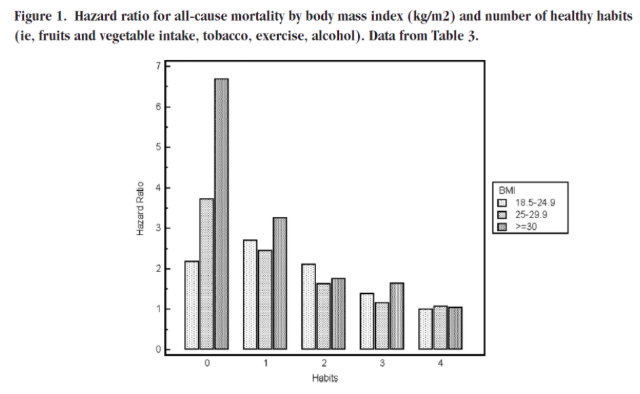
Figure: Matheson (2012)
Intuitive eating takes a weight-neutral approach to health. Some people may lose weight, some people may stay the same, and some may gain weight with intuitive eating. This concept is novel and scary. Especially for those of us who have dealt with years of chronic dieting in a wholesome pursuit of health. But it is the neutral nature of intuitive eating that allows for the focus on modifiable behaviours rather than a number on a scale that has no indication of a person’s health status.
So, if weight doesn’t = health, can weight loss still lead to better health outcomes?
Janet Tomiyama of UCLA decided to look into this research question. Janet and her team pulled every well-done, long-term diet study they could find, and found that dieting didn’t do much for the health of the participants.** They found that weight changes in the dieting groups were not linked to changes in cholesterol, blood pressure, or diabetes medication discontinuation. The takeaway from this? Even if the dieting group saw subtle changes in cholesterol, blood pressure, or the use of their diabetes medication, these changes were not related to their weight loss, rather their behaviours!
Another example of similar dieting outcomes can be found in the Look Ahead Trial, an intensive 15-year study with interventions aimed at achieving a 7% weight loss. These interventions included:
- Training in the tracking of food and drink
- Nutrition & diabetes management education
- Frequent contact with the program
- Meal replacements for easier calorie restriction
- 175+ minutes of exercise a week
- 10,000 steps per day
- Competition and social support with meetings
- Orlistat, a weight loss drug, when participants faltered in their weight loss.
What this study really found was that significant weight loss was not a typical result, despite how intensive the intervention was. Repeated attempts at weight loss did not improve the likelihood of significant weight loss. In addition to all this, at the 15-year follow-up, there was no difference in the prevalence of diagnosed type 2 diabetes between the lifestyle group (the ones who went through the study intervention), the metformin group (a drug for improving blood sugar control), and the placebo group (a group that got a pill with no medicine). This finding demonstrated that people who were going to receive a diagnosis of diabetes were going to get it over that 15-year span regardless of the intervention they received. Does this mean give up completely? No. But it does mean, dieting isn’t the fix!
Since weight loss isn’t associated with the health outcomes expected of dieting, is intuitive eating associated with improved health outcomes?
In a study looking into intuitive eating and Health at Every Size® among large-bodied females with a history of dieting, some neat things were discovered. The results indicated that the group practicing intuitive eating had better health outcomes over the 104-week study. These outcomes included a reduction in systolic blood pressure, a reduction in “bad” (LDL) cholesterol, and higher engagement in physical activity. These changes were sustained through the 104-week follow-up, while any changes seen in the group that was assigned to stereotypical dieting was not able to sustain positive health improvements. Overall, this study exemplified that the intuitive eating intervention resulted in improved health measures in the absence of dieting, while the dieting group was unable to sustain the measures of health as time went on.
Another study of college-aged females found that intuitive eating was associated with lower blood fat levels, and a reduced risk for heart disease.****This is consistent with findings of other intuitive eating studies.
Intuitive Eating is also associated with better psychological outcomes. In one IE study mentioned above, the researchers found that those who were in the intuitive eating/HAES® group were able to sustain improvements in mental health through the follow-up, while the dieters did not.*** The HAES® group members also became better at learning their internal cues and regulating their intake than the dieting group, which did not maintain improved restraint. ***
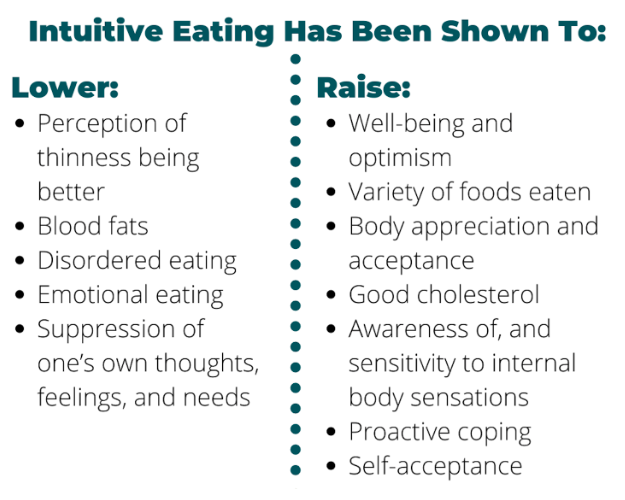
All-in-all intuitive eating seems to improve overall health in the long-term, whereas dieting does not. Like all areas of research, intuitive eating isn’t black and white. The findings thus far have been promising but many of the studies have small sample sizes and focus on female White participants with a history of binge eating or chronic dieting in Western cultures.
Lastly, it cannot be reiterated enough that health doesn’t equate to someone’s value. No one owes anyone their health. Health cannot fit one single mold for any group of people. Much of a person’s health is out of their personal control. I would like to end this post with a quote from the author, The Body is Not An Apology, Sonya Renee Taylor:
“Equally damaging is our insistence that all bodies should be healthy. Health is not a state we owe the world. We are not less valuable, worthy, or lovable because we are not healthy. Lastly, there is no standard of health that is achievable for all bodies”
Are you saying that I can never lose weight?
Taking a weight-inclusive/intuitive eating approach to nutrition doesn’t mean that weight loss will never happen. It simply means it is not the centre focus. It helps you move through your eating challenges, so that your weight will settle where it wants to. It’s okay to feel sad or angry about diets not working and letting go of the pursuit of weight loss isn’t easy. These things take time and the desire to change one’s body is a normal one. Check out this article if intuitive eating sounds interesting to you, but the idea of letting go of the pursuit of weight loss is scary —> https://nudenutritionrd.com/ditch-dieting/.
References:
*Matheson EM, King DE, Everett CJ. Healthy Lifestyle Habits and Mortality in Overweight and Obese Individuals. J Am Board Fam Med (2012)
**Tomiyama, A. J., Ahlstrom, B., & Mann, T. (2013). Long-term effects of dieting: Is weight loss related to health? Social and Personality Psychology Compass, 7(12), 861-877.
***Bacon L, Stern JS, Loan MDV, Keim NL. Size Acceptance and Intuitive Eating Improve Health for Obese, Female Chronic Dieters. Journal of the American Dietetic Association. 2005. doi: 10.1016/j.jada.2005.03.011.
****Hawks SR, et al. The relationship between intuitive eating and health indicators among collegiate women. Health Education; 2005.
*****Evelyn Tribole and Elyse Resch, Intuitive Eating


